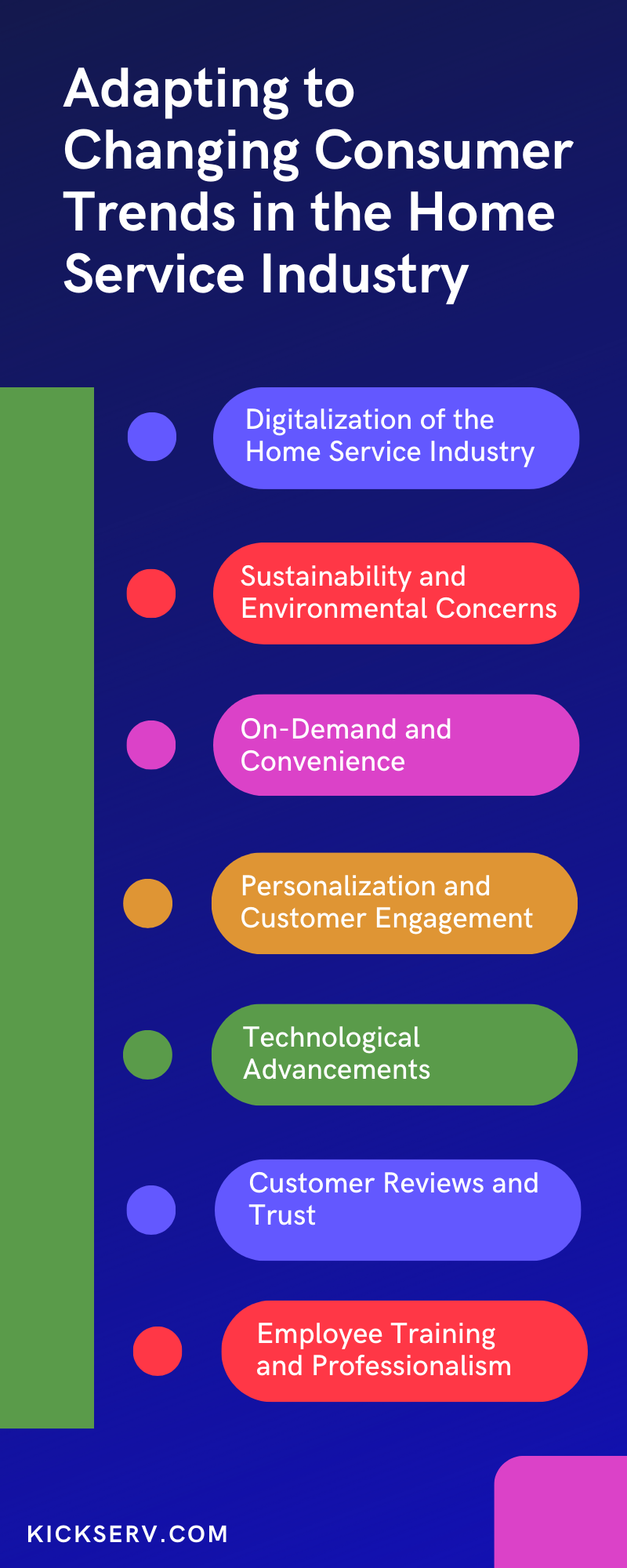
Adapting to Changing Consumer Trends in the Home Service Industry
Adapting to Changing Consumer Trends in the Home Service Industry
Introduction
Home service businesses have long been a cornerstone of the economy, made up of essential industries such as the plumbing business, lawn care business, landscaping services, handyman services, and more. However, in recent years, the landscape of this industry has undergone a significant transformation due to changing consumer trends. With the rise of technology, shifting demographics, and evolving customer expectations, businesses in the home service industry must adapt to remain competitive and relevant.
In this article, we explore the key consumer trends that are reshaping the home service industry and discuss strategies for adapting to these changes.
Digitalization of the Home Service Industry
The digital age has had a profound impact on every sector of the economy, and the home service industry is no exception. Today's consumers are more connected than ever, and they expect quick and easy access to services. Home service businesses benefit by embracing digitalization to meet these evolving consumer demands.
a. Online Presence
Having a strong online presence is crucial for home service businesses. A well-designed website, active social media profiles, and online review platforms are essential tools for attracting and retaining customers. Consumers now turn to the internet to search for service providers, read reviews, and compare prices. Home service businesses that invest in a user-friendly website and maintain a positive online reputation are more likely to win the trust of potential customers.
b. Mobile Apps
Mobile apps have become increasingly popular in the home service industry. Companies that offer apps for scheduling appointments, tracking services, and making payments can significantly enhance the customer experience. Technology tools like field service management software help provide convenience and transparency, two factors that today's consumers value.
Want to try a mobile app for your home service business? Sign up for a Kickserv trial to get two weeks free.
c. Digital Marketing
Digital marketing strategies like search engine optimization (SEO), pay-per-click advertising, and social media marketing, are essential for reaching a broader audience. Home service providers can no longer rely solely on traditional marketing methods like flyers and phone book ads. By utilizing digital marketing, home service businesses can target their advertising efforts more effectively to specialize in home services marketing and adapt to changing consumer behaviors.
Sustainability and Environmental Concerns
Another significant shift in consumer behavior is the increasing emphasis on sustainability and environmental responsibility. Consumers are more aware of the environmental impact of the services they use and are willing to choose service providers who share their values.
a. Energy Efficiency
Homeowners are increasingly interested in making their homes more energy efficient. This has led to a growing demand for services that improve energy efficiency, such as insulation installation, HVAC system upgrades, and solar panel installation. Home service providers that offer eco-friendly solutions can tap into this emerging market segment.
b. Sustainable Practices
Consumers are drawn to companies that practice sustainability and minimize waste. Home service businesses can adapt by using eco-friendly materials, reducing energy consumption, and properly disposing of waste. For example, cleaning businesses can provide services with eco-friendly cleaning supplies, and lawn care businesses can offer eco-friendly fertilizer and care practices. By promoting sustainable options, home service businesses can attract environmentally conscious customers.
c. Green Certification
Obtaining green certifications, such as LEED (Leadership in Energy and Environmental Design) or Energy Star, can give home service providers a competitive edge. These certifications validate a company's commitment to sustainability and can help attract the growing number of customers who prioritize eco-friendly choices.

On-Demand and Convenience
Today's consumers live fast-paced lives and value convenience more than ever. This trend has given rise to the on-demand economy, with services like ride sharing and food delivery setting high standards for convenience. Home service providers must adapt to this trend by offering more flexible and on-demand services.
a. Appointment Scheduling
Offering flexible appointment scheduling options is essential for easy job management in addition to customer satisfaction. Many customers want the ability to book services when it suits them, which means accommodating evenings and weekends. Additionally, providing same-day or emergency services can be a significant competitive advantage, especially when it comes to time-sensitive home repairs for plumbing businesses and HVAC services.
b. Remote Assessments
Incorporating remote assessments through video calls or photos can streamline the process and provide quick estimates to customers. This approach reduces the need for in-person visits, saving time for both the home service business and the customer.
c. Transparent Pricing
Transparent pricing is crucial in a world where consumers can easily compare prices online. Home service businesses should clearly outline their pricing structures, offer online quotes, and provide cost estimates upfront. This builds trust and ensures that customers have a clear understanding of the expected costs.
Personalization and Customer Engagement
Consumers today appreciate personalization and value businesses that engage with them on a more individual level. Providing a personalized experience and staying engaged with customers can lead to greater loyalty and increased referrals.
a. Customer Relationship Management (CRM)
Utilizing a customer relationship management (CRM) system can help businesses improve customer interactions.Good CRM systems allow home service providers to keep track of customer preferences, history, and needs, enabling them to offer more personalized service.
b. Loyalty Programs
Loyalty programs, such as discounts for repeat customers or referral incentives, can encourage customer retention. These programs not only reward loyal customers but also incentivize them to recommend the service provider to friends and family.
c. Social Media Engagement
Engaging with customers on social media platforms can foster a sense of community and strengthen the relationship between a home service provider and its customer base. Responding to comments, sharing helpful tips, and displaying success stories can go a long way in building a loyal customer base in addition to a strong online presence which can act as another form of home services marketing.
Technological Advancements
The home service industry has witnessed significant technological advancements that offer opportunities for businesses to enhance their services and efficiency. Staying up to date with the latest technology is crucial to meet consumer expectations.
a. IoT Integration
The Internet of Things (IoT) is transforming the home service industry. Smart thermostats, security systems, and appliances are becoming more common in homes. Handyman services, HVAC repair, and other home service businesses who can integrate with these systems, offer maintenance, and repair services for IoT devices are likely to see increased demand.
b. Augmented Reality (AR) and Virtual Reality (VR)
Another emergent technology in recent years, AR and VR tech can be used to assist technicians in diagnosing and repairing issues remotely. Customers can use their smartphones or AR glasses to show technicians the problem, reducing the need for in-person visits and minimizing downtime.
c. Artificial Intelligence (AI)
AI can also be used for predictive maintenance, helping service providers identify and address issues before they lead to costly breakdowns. Additionally, AI-powered chatbots can provide instant customer support, answer questions, and schedule appointments, improving efficiency and customer satisfaction.
Customer Reviews and Trust
Consumer behavior has shifted towards heavily relying on online reviews and ratings when making purchasing decisions. Trust and a positive reputation are paramount for success in the home service industry.
a. Encourage Reviews
Home service businesses should actively encourage satisfied customers to leave reviews on platforms like Yelp, Google, HomeAdvisor, and Angi. Positive reviews can significantly influence potential customers.
b. Respond to Reviews
Responding to both positive and negative reviews is essential. Not only does it demonstrate that the business values customer feedback and is committed to resolving any issues, but it also strengthens the company’s online presence and also works as a form of home services marketing.Public responses also help mitigate the impact of negative reviews.
c. Showcase Testimonials
Displaying customer testimonials on a website and in marketing materials can help build trust. Real-life success stories and experiences from previous customers can sway potential clients in favor of a particular service provider.
Employee Training and Professionalism
The behavior and professionalism of technicians play a significant role in a customer's perception of a home service provider. Companies must invest in employee training and maintain high standards of professionalism.
a. Customer Service Training
All employees should undergo customer service training to ensure they are polite, knowledgeable, and attentive to customer needs. Technicians should be trained not only in their trade but also in communication skills.
b. Uniforms and Identification
Technicians should wear well-kept uniforms and carry identification that clearly displays the company's logo and their name. This creates a professional appearance and helps customers identify legitimate service providers.
c. Background Checks
Conducting background checks on all employees instills trust in customers. Home service providers should be transparent about their hiring and screening processes to assure clients of their safety.
Conclusion
Adapting to changing consumer trends in the home service industry is essential for long-term success for home service businesses. To thrive in this evolving landscape, home service businesses in all industries must embrace digitalization, focus on sustainability and convenience, engage with customers on a personal level, and harness technological advancements. Building trust through customer reviews and maintaining high standards of professionalism are equally critical. By staying attuned to these shifting trends and continually evolving to meet customer expectations, home service businesses can secure their place in this dynamic industry.
Never miss a post.
Get notified of new content